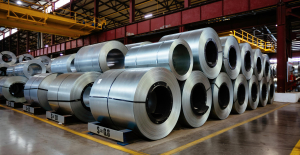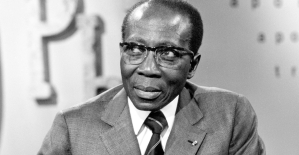Does it always have to be the latest? No, experts say, not even with system cameras and lenses. Material that is a few years old but otherwise in good condition is great to work with. And it is also sustainable. However, you should steer clear of used items from the entry-level class.
"Used system cameras are worthwhile for anyone who wants to save a lot of money and is not necessarily dependent on taking pictures with the latest technology," says Peter Nonhoff-Arps from the specialist magazine "c't Fotografie".
Even cameras that have not been available for purchase for several years still deliver high-quality digital images, says Nonhoff-Arps. With lenses, the price difference to new goods is not that big, but there are good chances of getting almost unused lenses at a reasonable price.
System camera only means that it is a camera with interchangeable lenses - even if the term system camera has been used here and there exclusively for models without a mirror. But: A single-lens reflex camera is also a system camera by definition.
Whether you choose a system camera with or without a mirror is ultimately a question of taste and habit. With a single-lens reflex camera, the light “travels” in an optical viewfinder via a mirror that folds away when the picture is taken, revealing the image sensor.
Mirrorless system cameras, on the other hand, have an electronic viewfinder. With them, the light falls directly on the sensor, which then sends the image to a high-resolution mini display that is in the viewfinder. The cheapest system cameras without a mirror sometimes don't even have a viewfinder. Here the live image control must be carried out via the display on the back of the camera.
An advantage of mirrorless system cameras: Due to the slimmer design without mirror, mirror box and optical viewfinder, they are not only lighter, but usually also much more compact than the housing of SLR cameras.
Nonhoff-Arps recommends buying used cameras and lenses from dealers: "The advantage is that you can test them on site and usually get a guarantee." However, the price is often significantly higher than from private sellers. The online retailer is a compromise between these two poles.
According to Nonhoff-Arps, the online business is in the midfield in terms of price. In addition, online retailers would also have to give a guarantee and take back the goods in case of doubt. "But when it comes to valuable cameras and lenses, it's worth going to the supplier to take a look at the objects of desire."
Buying used cameras and lenses in a shop makes sense not least because there are a few things you should pay attention to and check. A whole series of points, Nonhoff-Arps: "From the sensor to signs of wear on the housing, display, tripod socket or hot shoe to the condition of the battery". With lenses, the condition of the lenses is relevant and you have to check whether there are dust inclusions.
Vincent Meyer regularly buys used cameras for his Berlin photo shop and knows what is important. His first check is the overall condition, the external appearance. "With a camera that's already badly scratched, there's a higher risk that something's going wrong." Point two: In any case, the image sensor should be free of dirt.
According to Meyer, how much money you actually save when buying a used camera depends heavily on the camera model in question. "If you buy a product that is currently still being manufactured and sold, you can save 20 to 30 percent," says the expert.
But up to what age is it worth buying a used system camera? At what point does the lower price no longer outweigh the perhaps outdated technology and, above all, image quality? If you weigh the range of functions and photo quality against the potential price reduction, Vincent Meyer believes that buying used digital cameras is worthwhile up to a camera age of five to six years.
"Otherwise you have to be very familiar with it and really be sure that it still works," says Meyer. "Because the technology has developed so rapidly that with older models you get results that deviate far from today's standard."
According to Peter Nonhoff-Arps, however, there are models that are still worth recommending even after ten years: "These mostly included cameras in the upper middle and upper class of the time." Buying older entry-level cameras and lenses second-hand, on the other hand, is not worthwhile, even if they are available for little money.
"Everything on shares" is the daily stock exchange shot from the WELT business editorial team. Every morning from 7 a.m. with the financial journalists from WELT. For stock market experts and beginners. Subscribe to the podcast on Spotify, Apple Podcast, Amazon Music and Deezer. Or directly via RSS feed.

 Sudan ravaged by a year of war
Sudan ravaged by a year of war Ten years after the kidnapping of the Chibok girls, what has become of the terrorist group Boko Haram?
Ten years after the kidnapping of the Chibok girls, what has become of the terrorist group Boko Haram? The Israeli government divided on the extent of its response after Iran's direct attack on its territory
The Israeli government divided on the extent of its response after Iran's direct attack on its territory “Is it time for a killing blow?” : the Israeli press wonders about a response after the Iranian attack
“Is it time for a killing blow?” : the Israeli press wonders about a response after the Iranian attack Covid-19: everything you need to know about the new vaccination campaign which is starting
Covid-19: everything you need to know about the new vaccination campaign which is starting The best laptops of the moment boast artificial intelligence
The best laptops of the moment boast artificial intelligence Amazon invests 700 million in robotizing its warehouses in Europe
Amazon invests 700 million in robotizing its warehouses in Europe Inflation rises to 3.2% in March due to gasoline and electricity bills
Inflation rises to 3.2% in March due to gasoline and electricity bills Large French companies are alarmed by the stalling of the European economy
Large French companies are alarmed by the stalling of the European economy New sanctions against Russia send industrial metal prices soaring
New sanctions against Russia send industrial metal prices soaring Olympic Games 2024: civil servants authorized to carry out private security activities
Olympic Games 2024: civil servants authorized to carry out private security activities Threat of strikes for the 2024 Olympics: Macron says he has “confidence” in the “spirit of responsibility” of the unions
Threat of strikes for the 2024 Olympics: Macron says he has “confidence” in the “spirit of responsibility” of the unions Musical show: “Come Bach”, fantasies around the composer
Musical show: “Come Bach”, fantasies around the composer The cry of alarm from Senghor's friends has been heard
The cry of alarm from Senghor's friends has been heard World Chess Championship: Nepomniachtchi and Gukesh lead the candidates tournament
World Chess Championship: Nepomniachtchi and Gukesh lead the candidates tournament Rapper Heuss L’Enfoiré calls on Ronaldinho for his new music video
Rapper Heuss L’Enfoiré calls on Ronaldinho for his new music video Skoda Kodiaq 2024: a 'beast' plug-in hybrid SUV
Skoda Kodiaq 2024: a 'beast' plug-in hybrid SUV Tesla launches a new Model Y with 600 km of autonomy at a "more accessible price"
Tesla launches a new Model Y with 600 km of autonomy at a "more accessible price" The 10 best-selling cars in March 2024 in Spain: sales fall due to Easter
The 10 best-selling cars in March 2024 in Spain: sales fall due to Easter A private jet company buys more than 100 flying cars
A private jet company buys more than 100 flying cars This is how housing prices have changed in Spain in the last decade
This is how housing prices have changed in Spain in the last decade The home mortgage firm drops 10% in January and interest soars to 3.46%
The home mortgage firm drops 10% in January and interest soars to 3.46% The jewel of the Rocío de Nagüeles urbanization: a dream villa in Marbella
The jewel of the Rocío de Nagüeles urbanization: a dream villa in Marbella Rental prices grow by 7.3% in February: where does it go up and where does it go down?
Rental prices grow by 7.3% in February: where does it go up and where does it go down? Europeans: the schedule of debates to follow between now and June 9
Europeans: the schedule of debates to follow between now and June 9 Europeans: “In France, there is a left and there is a right,” assures Bellamy
Europeans: “In France, there is a left and there is a right,” assures Bellamy During the night of the economy, the right points out the budgetary flaws of the macronie
During the night of the economy, the right points out the budgetary flaws of the macronie Europeans: Glucksmann denounces “Emmanuel Macron’s failure” in the face of Bardella’s success
Europeans: Glucksmann denounces “Emmanuel Macron’s failure” in the face of Bardella’s success These French cities that will boycott the World Cup in Qatar
These French cities that will boycott the World Cup in Qatar Augusta Masters: the unchallenged reign of Scottie Scheffler
Augusta Masters: the unchallenged reign of Scottie Scheffler Tennis: Harold Mayot takes Cachin and goes to the second round in Barcelona
Tennis: Harold Mayot takes Cachin and goes to the second round in Barcelona Barça-PSG: “We will do it”, Luis Enrique shows his confidence before the return match
Barça-PSG: “We will do it”, Luis Enrique shows his confidence before the return match Hakimi on Mbappé before Barça-PSG: “I feel very good, very motivated, like the whole team”
Hakimi on Mbappé before Barça-PSG: “I feel very good, very motivated, like the whole team”


















